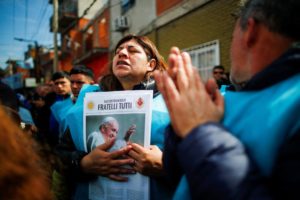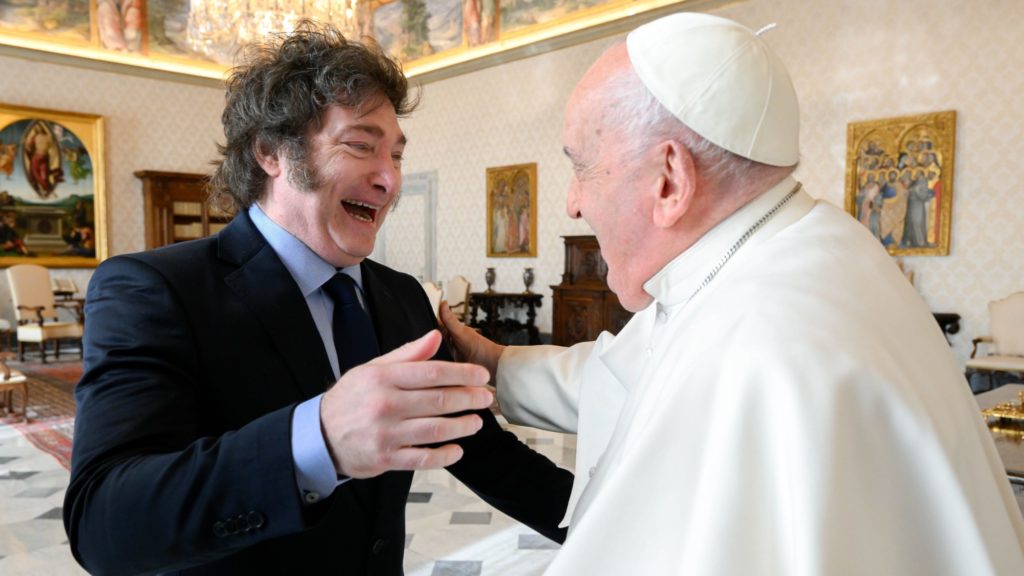When Pope Francis shared a warm embrace with Argentina’s new rightwing populist President Javier Milei in February, the image provoked a bit of whiplash among those who could remember the Milei of just a few months ago.
A former television pundit and an ultra-libertarian economist, Milei was elected president of Argentina with 56% of the national vote in November.
Among other things, Milei during his fiery electoral campaign raised eyebrows for the remarkable language he used to describe the pope, calling Francis an “imbecile,” a “communist,” a “filthy leftist,” and a “son of a b****,” just to offer a sampling.
Milei’s critiques of social policies advanced by leftwing governments and his radical reform strategies to pull Argentina out of a decades-long economic and social crisis were seldom polite. To add to the controversy, many of his tirades have targeted the Catholic Church’s social doctrine.
Yet all that seemed to fade into the background during a highly anticipated meeting between Francis and Milei during the Feb. 11 canonization Mass in Rome of Argentina’s first female saint, Maria Antonia of Saint Joseph de Paz y Figueroa, affectionately known by Argentinians as “Mama Antula.”
The two Argentine leaders met briefly before the ceremony, and Francis paused to greet Milei and other government ministers again before leaving St. Peter’s Basilica. Notably, Milei chose to break protocol and asked to give the pope a beso, a kiss on the cheek that is a customary greeting in most South American nations.
Images of the encounter portray a smiling pope, who reportedly jested with Milei, asking if he’d gotten a haircut, and a grinning Argentine president who stooped low to embrace the leader of the world’s roughly 1.3 billion Catholics.
The two held an hourlong private meeting the next day, with a brief Vatican statement describing the discussion as “cordial” and having focused on relations between the Holy See and Argentina, Milei’s strategy to counter the country’s economic crisis, and the need to promote peace in light of global conflicts.
Afterward, Milei described Francis on a radio interview in Rome as “the most important Argentinian in history.”
How did Francis and Milei go from insults to embrace, from opposition to high praise? The answer comes down to the difference between campaigning and governing.
During his electoral campaign, Milei focused on making the kind of statements that would get him consistent publicity while also firing up his base.
However, as the new leader of a deeply divided country grappling with a severe and protracted financial crisis, Milei’s focus has shifted to building consensus, if he wants progress to be made.
According to Argentina’s INDEC statistics agency, some 40.1% of the population currently lives in poverty and inflation rates stand at over 200%, leaving much of the country destitute and desperate for a solution.
One clear way to reach out to the opposition and thus attempt to build this consensus is to reach out to the person the opposition looks up to and who is seen as their champion. In this case, that is Francis.

Francis himself seemed to handle Milei’s oratorical creativity as a candidate extremely graciously, dismissing Milei’s remarks in an interview shortly after Milei was elected.
“You have to distinguish a lot between what a politician says in the election campaign and what he actually does afterward, because then comes the moment of concreteness, of decisions,” he said.
For Francis, there is also the factor of ego, in that a pope generally carries more global significance than most presidents of individual nations, and as a prominent religious leader, is seen as occupying a higher moral ground.
If Francis were to respond to Milei in kind, he would essentially be stooping to Milei’s level, implying they are in some way equals. Yet by ignoring Milei’s remarks and choosing to stay above the fray, Francis helped ease tensions and make such a turnabout with Milei possible.
Their encounter should also be seen in the lens of a potential papal trip.
Francis has repeatedly expressed his desire to visit Argentina this year, a potential trip Milei has also publicly voiced support for. In this sense, both men want the trip, and they need each other to make it happen.
Francis has consistently voiced his fear that a return trip to Argentina would be manipulated for political ends, and by diffusing tension with Milei from the start, he is basically trying to take the air out of the balloon so that a trip becomes possible in a political context.
Milei, for his part, faces an imploding economy and an urgent need for the type of social cohesion that a papal trip could offer at such a critical juncture, so being friendly with Francis is also a step in the direction of potentially keeping the country from falling apart.
Age is also a factor for Francis, who is 87 and suffers from several health-related maladies, and who desperately wants to make his long-awaited return to his home country while international travel, though not uncomplicated, is still possible.
In terms of how much of Francis and Milei’s apparent reconciliation is genuine, and how much is simply politics, the best answer would probably be that it’s a little of both.
They obviously each have their own agenda in the relationship, and they in some way depend on one another for that agenda to be accomplished, but their friendly encounter shows there is also likely a good deal of respect, too, whatever their differences may be.

